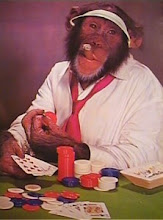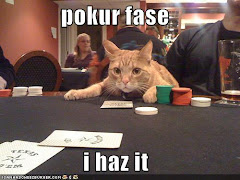*I expect that this
will be the last post I ever make on this blog.
As you can see I have not posted anything in well over three years. Once you have a child, you give up your own
little hobbies, like writing about poker, for something much more precious and
important – another life. I don’t expect
to ever have the time again to do much writing on this wonderful game of ours,
though I do get to play poker every few weeks and will always love it. -FB
To play consistent, winning poker requires two general abilities: 1.) the ability to accurately identify what your opponent has, within a fairly narrow range, and 2.) the ability to then determine the optimal strategy based upon that accurate read.
These two steps are critical in virtually every hand of poker you play, regardless of game, format, stakes, number of players, physical location (i.e. online or live), etc. Actually, the first step, i.e. reading your opponent and his hand, is more important than the second step, i.e. optimal betting strategy, because making the right decision as to the second step depends entirely upon your having made the right read in the first step.
To play consistent, winning poker requires two general abilities: 1.) the ability to accurately identify what your opponent has, within a fairly narrow range, and 2.) the ability to then determine the optimal strategy based upon that accurate read.
These two steps are critical in virtually every hand of poker you play, regardless of game, format, stakes, number of players, physical location (i.e. online or live), etc. Actually, the first step, i.e. reading your opponent and his hand, is more important than the second step, i.e. optimal betting strategy, because making the right decision as to the second step depends entirely upon your having made the right read in the first step.
In that sense, your betting strategy necessarily has to
depend more on what you think your opponent has than upon your own hand. Indeed, if your opponent lays down his hand,
and you take the pot without a showdown, then it really doesn’t matter what you
had. Your opponent folded in reaction to
your betting actions and what he thought you had, not what you actually had
(which he will never know unless you are amateurish enough to show him and
everyone else at the table).
Because reading your opponent’s range of likely hands is the
single most important skill in poker, you should be trying to put your opponent
on as narrow a range of most probable hand as you can, literally at every
moment throughout the hand, from the start of pre-flop betting to the very last
decision on the river. Obviously, you
could be totally wrong at any point as to what his range might be, or as to how
wide or narrow a full range of possible hands you should give him. But you have to narrow or widen the range of
hands for which you give him credit as you learn more and more information on
each street of betting.
The best players in the world can consistently, and
amazingly, put their opponents on a range as narrow as three hands, two hands,
or even one exact hand, and get it right an astonishingly high percentage of
the time. Based upon these tight reads –
developed from playing millions of hands over many years of poker experience
and subsequent reflection on those hands after each poker session – these top
pros then make optimal betting decisions to extract the most money possible
from their opponents when they have them beat, or to lose the least money
possible when they don’t, or to force opponents to fold.
Probably about 80 percent of all poker skill comes down to
the ability to determine the strength of your opponent’s hand. The
other 20 percent or so of poker skill includes
everything else: betting strategy,
calculating pot odds, knowledge of poker mathematics, being able to read
physical tells, being able to suppress you own tells, emotional control,
discipline, etc.
Simply put, the essence of good poker is reading your
opponent’s hand correctly. It is not so
much reading your opponent himself (i.e. his tells, tendencies, table image,
style, etc.) but, rather, reading his hand (i.e. narrowing down his range of
most probable hands). If you can read
your opponent’s hand, you will win in the long run. If you can’t, you won’t.
You could be the greatest math genius in the world, able to
calculate pot odds as fast as a NASA computer, but if you can’t figure out what
the man across from you is holding, within a reasonable range of most likely
hands, then your mathematical talents will be useless. Likewise, you could be an FBI-trained
negotiator, able to determine when a human being is lying or not most of the
time in the non-poker world, and yet this ability will not help you to win in
poker at all if you cannot figure out what your opponent has.
Yet if you can determine your opponent’s range of hands,
then you don’t need to be able to do complex math, or detect facial tells, or
know the optimal strategy to play in every single hand, because those things
are of far lesser importance to your long term success in poker. Almost always, if you correctly figure out
your opponent’s range of hands, then everything else should be obvious.
In any poker hand, you should always be doing two things:
1.) Narrowing down your opponents’ hands as accurately as you can, and then 2.)
deciding what is the best action to take given all information available and
all aspects of good poker strategy.
















